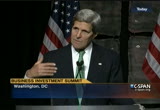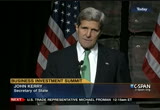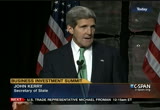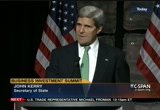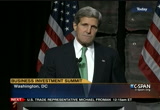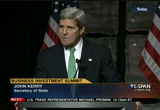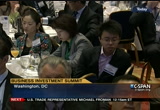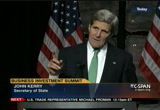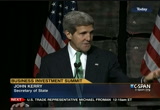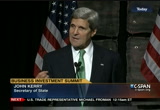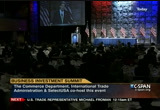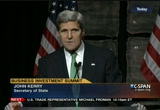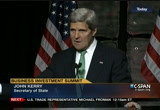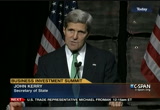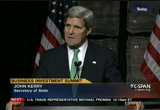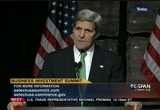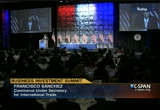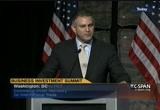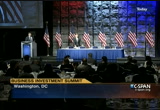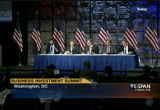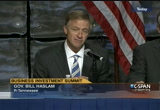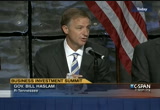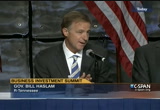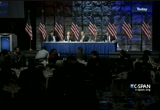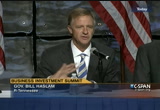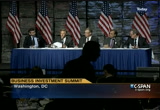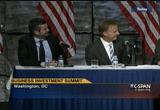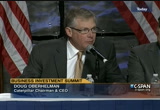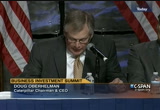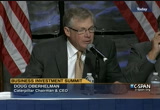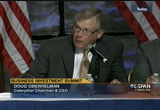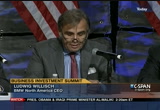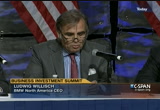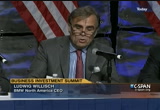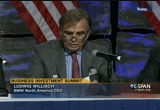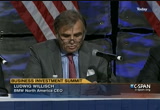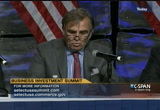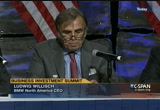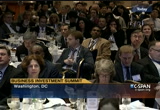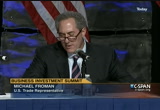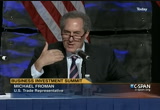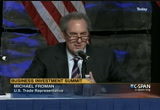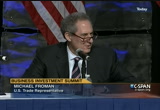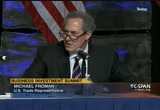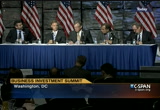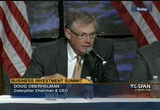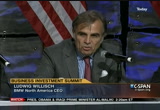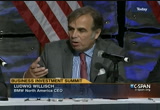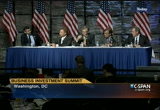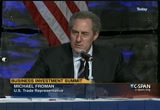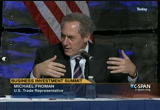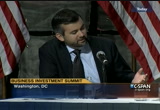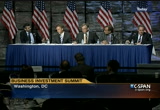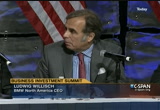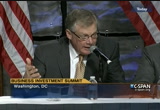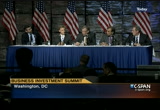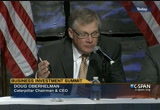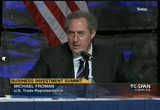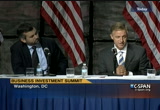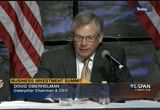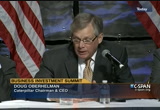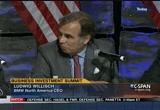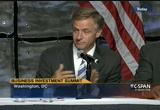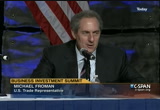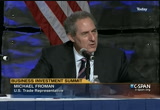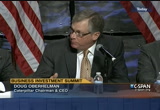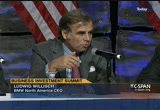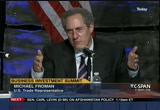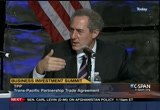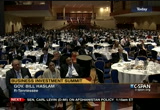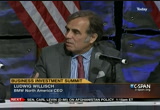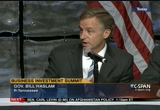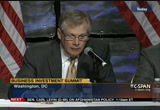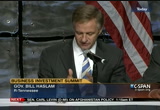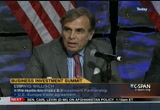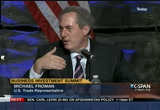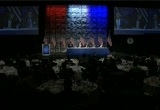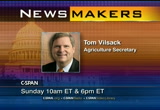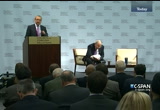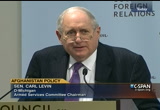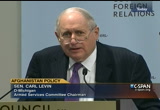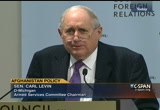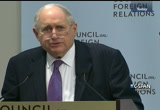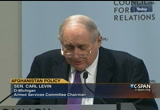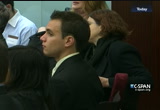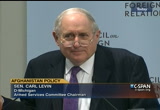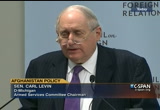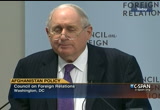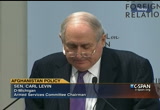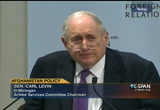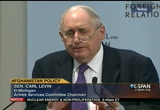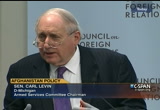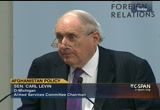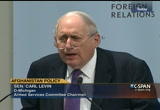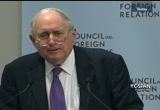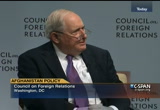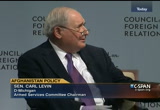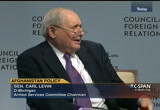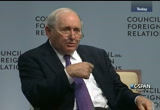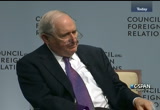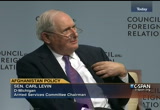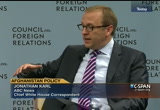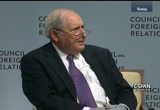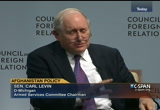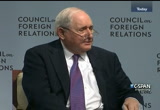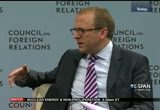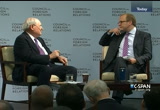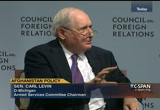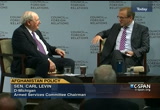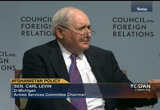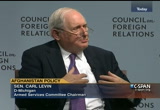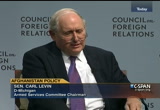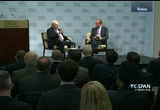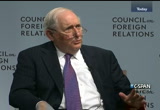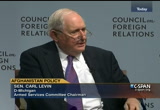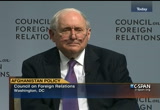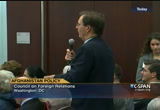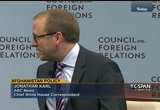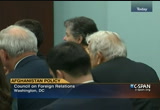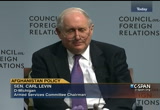tv Key Capitol Hill Hearings CSPAN November 2, 2013 12:00am-2:01am EDT
12:00 am
united states is lucky to be able to offer the world's best climate today. as obama has made it clear that we are going to work at it even harder. it is about the future. we will refuse to sit still. a world is getting more competitive, but so are we. capital chases capital. i'm confident we will continue to get stronger and be more effective. select usa is a big reason why. as you heard yesterday and during the week that we are working hard now to make it easier for you to be able to invest here and making that effort is a much bigger part of our mission, especially now at the state department.
12:01 am
at home, we are coordinating at every level. mayors in small towns all the way up to president obama. they're working with the foreign commercial service that we must organize dedicated investment teams led by our capable ambassadors and our staff and we will actively encourage job investment in the united states as a core priority. our diplomats put a huge role in helping businesses succeed. one of ambassadors lebanon tends average to encourage texas startups to come to the united states. the auto industries making a remarkable comeback. all over the world, working hard to help businesses meet their
12:02 am
goal. the state department is engaged with a new level of intensity and focus because of the nature of the global marketplace. we believe we can do more and we will do more. starting at 32 markets that represent 90% of all of the investment that comes here. what does that mean for business leaders like you? it means you will have a single point of contact to connect your company with our markets and investors and the economic development organizations who are here to help you and your businesses grow. just the other week, i met with a group of ceos indonesia -- in indonesia. some expressed frustration to me with some of the foreign governments who preach the principle of open markets, but they act as protectionism. these ceos know that for your
12:03 am
--freer markets create more opportunity, more growth, more dynamism and more innovation. the freedom to fail is an important component in succeeding. in order to open more doors and continue the best investment climate in the world, we are going to continue to add to our strong portfolio of trade agreements that reaffirms our commitment to open and free markets. to have a level playing field. globalization means that people everywhere have higher expectations. in many ways, the revolutionary events taking place in the middle east and other parts of the world are a reflection of that. the tunisian revolution that peacefully removed a dictator
12:04 am
some 30 years was not ideological. it was not inspired by religious extremism. it was a fruit vendor that wanted to practice trade without interruption and without interference. that's part that revolution. people wanted to reach aspirations that they know that others in the world are living. in tahrir square was young people texting each other and using their smartphones and the virtues of being able to text and delete and connect with people -- and tweet and connect with people. it brought about another revolution.
12:05 am
the same thing with syria. no leader anywhere in the world can afford to look away from huge populations of young people coming at us in unprecedented numbers. it is a different world. it will change politics. all of them in touch with aspirations. it is a different world. what we are going to try to accomplish with two enormous and high standard trade negotiations that are underway right now is to raise the standards and the possibility for people that trans-pacific partnership represents 40% of trade. and we can lock that in, it will open up trade around the world. it is the largest market in the world. it will create an enormous transformation in the standards
12:06 am
that people are practicing. it is the largest market in the world. those efforts will dramatically expand our market reach and they will strengthen trading so we can engage and race to the top. not a race to the bottom. that helped everyone compete while ensuring strong protections for workers and consumers and the environment. while we are talking about markets, we are looking at the biggest marketing world. some people try to grab it. imagine this. the market that created the great wealth of the united states in which every single income earners saw the income go up in the 1990s and created unprecedented wealth, more
12:07 am
wealth than what was ever created, much more wealth created in the 1990s. that was a $1 trillion market. the global energy market is a $6 trillion market. it will climb to some where around 6 billion or more users. this is the most incredible market ever and the solution to climate change. we will fight to stay at the forefront of this energy market. we will recognize that it has the benefits of climate change as well as the marketplace. we will develop clean
12:08 am
technologies that will empower the world and protect our environment at the same time. we are on pace to become the largest oil reducer by 2020. the largest oil producer in the world. that gives us the promise of alternative fuels come including shale gas. we will become fully energy self-sufficient i the year 2035. -- by the year 2035. it is energy that fuels our air and that private sector. that is the energy that comes out of american value called entrepreneurship. the united states knows how to cultivate startups. not too long ago, our country was a start up. innovation is not just in our interest, but in our dna. that is why we aggressively protect intellectual property rights as part of a strong transparent or accountable or legal system. today we need entrepreneurship more than ever.
12:09 am
as more and more young people join the labor market, the world would need about half one billion new jobs by 2030. many of those jobs i guarantee you have not even been invented yet. entrepreneurship would help solve that puzzle and select usa can help. a few weeks ago, i met with hundreds of entrepreneurs while i was in kuala lumpur. these are innovators they came from all around the world and the could not wait to build the next big thing. who knows? the best ideas are never limited by borders. these folks might be the ones that are changing the world. it is that kind of openness that drives american economy and foreign economies and moves all of us forward at the same time. needless to say, we have our own interest here.
12:10 am
it is no secret that our president's number one by yorty -- priority is creating strong middle class jobs here at home. he also knows that the best way to do that is to strengthen our international ties and foster broad growth around the world. we know that demoting inclusive inclusive growth and strengthening the rule of law and other countries also helps us to create new markets for our businesses and jobs for workers. when we help other nations to develop their own ability to govern and meet the aspirations of the booming population, we foster stable societies and everybody here knows stability is pretty important with respect to investment decisions and prognosis. we do what we do because we have always known that we are all in this together. we are all connected in this.
12:11 am
that is another reason why the united states the believe is the best place to invest. no other country where you can be confident that your investment is going to contribute to a shared cost -- prosperity. that idea is one of the cornerstones of our country. you saw it in the marshall plan. the marshall plan rebuilt -- after a war when all of the economies were strader -- shattered and broken. we all shared in a post-war prosperity. you sit in the recipients of those are graduating from the ascent -- assistance into full- fledged partnership in the trading community. look at south korea. in less than a generation, south korea has been transformed from
12:12 am
an aid recipient to one of the biggest contributors in the world. that kind of shared prosperity today is more important than ever before for the reasons i talked about earlier about young people and their aspirations. we also know in the united states that we are part of something much bigger than buying or selling in hiring and investing. before everyone is a ceo or secretary of state, we are citizens and by virtue of the fact that you are here, i know that you consider yourself citizens of the world. remember our shared responsibility to ensure shared prosperity is one of the most important ways we advance shared security.
12:13 am
as secretary of state, i have traveled a lot. i do it for a reason. there is no substitute for face to face diplomacy. there is no more reliable way to build trust and ensure interest and values are aligned to close a deal. that is why you come here from all over the world to be in washington and meet each other face to face and build relationships and share the ideas that could hopefully and conceivably change the world. as you build that confidence in each other, i want you to know there is no market in the world that i believe deserves your confidence more than this one. as investors and friends. i think you understand that the united states, despite momentary political hiccups and despite sometimes the politics, still marches forward with a private sector that is increasingly empowered to define for itself what the economic future will be. my message to you is now is the
12:14 am
best time to make that investment. my pitch to you is pretty direct. get in on the ground floor of this century of possibilities and transformation, the possibility of a great global century, a century that hopefully will be defined almost exclusively by the shared prosperity it lifts everyone around the world. individuals who yearn for the opportunity to touch what we have are able to. the sooner we get around to the business of doing it, the sooner we will solve some of the challenges we face today. thank you for letting me be here with you. thank you. [applause] [captions copyright national cable satellite corp. 2013] [captioning performed by national captioning institute]
12:15 am
>> and u.s. trade representative the spoke at the white house summit on business and investment. he was part of a panel with ceos from caterpillar and bmw that talked about partnerships. this is one hour. [applause] >> good morning, everyone. secretary kerry, thank you very much for that excellent, excellent speech. and thank you for joining us on the second day of our summit. we had a great day yesterday with president obama, with speakers and panelists, and all of the networking and match making opportunities. today promises to be even better. so let's get started. i am pleased to announce the start of our first panel entitled "why select the usa? using the u.s. as an export platform." we have a great lineup,
12:16 am
including my friend michael froman, governor from tennessee, ludwig vilic, the ceo of bmw north america, and the ceo of caterpillar. i'm going to let the moderator go into a little bit more detail on each of our panelists. so let me introduce who will moderate today's panel. neil irwin is a columnist and economics editor of a widely read blog in "the post." you can get the post's news on policy and analysis. neil is an author who led the post coverage of the financial crisis. ladies and gentlemen, please give a warm welcome to our
12:17 am
moderator neil irwin. [applause] >> thanks so much. i will do the quick introduction. you heard from the secretary. we have been through an era in which trade deals are with small countries. now we have trade deals with europe and cross regions. the governor of tennessee, bill haslem, is from the state that has succeeded as an exporter. it is good to have him with us. [applause] another of america's great export success stories is caterpillar, the giant exporter of mining and construction agreement. the -- equipment. the ceo is with us today.
12:18 am
[applause] caterpillar is a great story of an american company who exports to the world. we also have the leader of a great european company that makes a great deal of stuff in the united states and we are proud to have ludwig vilic, the ceo of bmw north america. [applause] and the man who's negotiating these trade agreements for the united states, the u.s. trade rep, ambassador michael froman. [applause] we are going to start with a few comments from each panelist. >> thank you. it is an honor to be here. i have been governor of tennessee for three years and one of the things people ask you is what have you learned? the answer is a whole lot, but one of the quick things he learns is this --international trade agreements directly impact the job of the state governor.
12:19 am
when i started running several years ago, that certainly would have been one of the key issues. it is definitely true. let me give you context. in tennessee, we are proud of the fact that we still make things. we make a lot of automobiles, we make a lot of furniture, which people thought had gone from being produced in the u.s. we had a company just last week announced they are moving jobs from china back to tennessee to produce things. we make a lot of medical supplies. we are proud of the fact that we still make things. as you'll see from some of my comments, the ability to make and sell those things is directly impacted by many of our foreign agreements. in context, we sell about an export to europe about $5.3 billion, about $2 billion to china. foreign direct investment in the u.s., and in tennessee we have 880 different companies located
12:20 am
in tennessee, largely led by a lot of japanese companies. nissan came to tennessee 30 years ago. and a lot of automotive industry and suppliers have sprung up around them. i was interested to hear when she said there are 1.7 million americans working in manufacturing jobs with foreign ownership. in tennessee, even though we are 2% of the population, we make up seven percent of that total number of folks in the manufacturing business with foreign ownership. we are proud of the fact that for the last four years we have been named the leading state for automotive manufacturing. we have the largest cargo hub in the u.s., and the second largest in the world due to a small company called fedex. and we have four international export development offices in the u.k., germany, mexico, and china.
12:21 am
tennessee exports are estimated to grow if the t-tip tariff treaty happens, we think our exports will grow about 35%. close to $2 billion is at stake. we rank second in the nation for the manufacturing jobs created over the last year. first in the southeast in both per per capita -- per capita income growth in gdp for the last 12 months in the top 10 in the country. we rank, the second leading state in the country for medical equipment supply exports. about 11% of the nations exported medical equipment happens out of tennessee, even though, we are 2% of the population. there is a reason. fedex dominates in that business. in medical equipment if you need
12:22 am
it, you need it right then. as a wrapup, let me give an example of three large companies that export out of tennessee and why it is important and why the tariff, the treaties we are talking about are important. eastman chemical is located in upper east tennessee and has 7000 employees. it is there global headquarters. they export about 1.5 billion per year. if the treaty is passed, that would increase chemical sales about, exports about $800 million a year to europe. nissan is the headquarters in the americas and their plant in tennessee is third-largest in the western hemisphere. about 14% of the vehicles that they produce are exported.
12:23 am
a medical equipment suppliers is in memphis, and the value of their exports is $1 billion. on a lighter note, we export a few other things -- we export this brown liquid that people seem to know, by the name of jack daniels. i say i am the governor of tennessee. they say, oh jack daniels, dolly parton. we got it. [laughter] we have some other nice things we export. we are not alone for music, not just country. on the sweeter note, we make 300 m&m's everyday, and unilever announced they are building the world's largest ice cream plant in tennessee. from chemicals to automobiles to sugar, we have you covered. let me talk about the stakes in terms of free-trade agreements and the impact. soon after coming into office, audi was looking at locating a plant somewhere very they ended up, a $1.3 billion investment. they ended up in mexico.
12:24 am
there are a lot of reasons. for governors, when a plant locates an artist state is -- in our state, it is because the governor did a great sales job. [laughter] one of the reasons here were the tariffs to import, to export from the u.s., 10% to europe and 30% to purcell. we are relatively confident -- 30% to brazil. we are relatively confident that one of the reason that investment that went to mexico is because of the tariff agreements. full implication of t-tip would increase auto exports to europe by $900 million. the panelist from bmw will talk about the added costs for that. a few numbers to wrap up with -- countries that we have free- trade agreements with our per capita exports are 16 times what the countries we have free-trade agreements as those that we do
12:25 am
not. after nafta our exports to mexico went up 8 times, to canada three times. after the agreement with chile our exports went up 10 times. talks about the medical equipment. our exports to australia went up 8 times after the free-trade agreements. i'll come back to the point i made -- as a governor, we are not involved in the negotiating treaties. but those treaties have incredible impact on the things we do. look forward to discussing it more. >> we have an hour. i am hoping to hear you pitch both caterpillar and the m w on locating in tennessee -- and bmw on locating in tennessee. >> that is why we are here. [laughter] >> governor, thank you for a great review. we have a strong presence in nashville with the financial services business. 700 employees. everyone there is happy and
12:26 am
really likes tennessee for lots of reasons. can you say it one more time? ditto. i am often asked about manufacturing in america and can we compete from the u.s. on a level playing field? why don't we build anything? we build a lot here. it is very timely that i came from athens, georgia, last evening because yesterday we cut the ribbon on a brand-new greenfield factory, 850,000 square feet, 1400 people strong when it is fully operational at the end of next year. and these will be small bulldozers and small excavators that were formerly only produced in japan. we brought those to the united states for several reasons. one, we can compete from a base here. two, we like the ports system here. and a lot of that production will stay in the u.s. and a lot of that will be exported to south america and europe.
12:27 am
we feel there is a very good chance and a very good condition to not only build here but compete from a us-based. a year ago, we did the same thing in south texas on another excavator plant. 40 ton machines that also came from japan. we will be building those for the first time in the united states and exporting to south america. some of that is coming back to the u.s., and i'm very proud of that as a u.s. manufacturing -- a u.s. manufacturing company. in fact, we spent about $6.5 billion in capital expense in five years in the united states. we invested heavily here. we have also spent about $10 billion in research and development over that same five years. we have plant after plant in our system in the united states that exports very large mining equipment. solely from the united states. we have factories in the midwest where 80% of the production is
12:28 am
for export only. we work hard at being competitive both internally in our system at caterpillar, but we also work hard with the u.s. government and michael and many others to open markets outside the u.s., because after all, 95% of our potential customers are not in this country. we desperately need that. over the last five years, our total exports have exceeded $82 billion from the united states. and those are destined for virtually every country in the world at some point or another. i cannot over emphasize the benefits of trade. but sometimes it is a hard message. free trade, open trade, and globalization sometimes has a pretty tough context in a lot of the small towns where plants are. -- our plants are. without that, without access to those 95% consumers outside this country, i do not know where we will be a generation or two from
12:29 am
now. we all need to work on that. finally, as an editorial, and i will conclude, we use xm bank -- ex-im bank. they are part of the competitive landscape. other countries use them aggressively and every time we we go up against them because most of our competition is outside the u.s. they are competing with us for jobs, for customers, for our people. we have got to compete and ex-im needs to be a critical element of that play as we go forward. that is something that is also on the agenda along with open and free trade as we go forward. with that, i will conclude, thank you. >> neil, thank you very much for having me. bmw embraces the concept of the u.s. as a viable export but for.
12:30 am
-- platform. the collaborative and open free- trade agreements in this country have provided the basis for bmw to make a major investment in the production facility which not exports a majority of its vehicles worldwide. bmw group has a success story to share in our south carolina plant. however small it could be. when all parties come to the table to ensure more open bilateral trade agreements are embraced. back 1989, when our company was looking to locate a new bmw manufacturing plant in the u.s., we received invitations from many state governors. they all had an rsvp attached. we understand the french phrase, respondez s'il vous plait, and we did respond. however, rsvp also has another meaning, and this helped us to
12:31 am
determine the actual site we chose. to use, rsvp is an acronym for the values that had to be met for this new manufacturing facility to be successful. r as in responsible s as in sustainable. v as in valuable. and p as profitable. in evaluating many american sites, applying our values, we chose spartanburg, south carolina, and opened the plant in 1994. today it is an unqualified success in terms of production and worldwide exports. i will give you some metrics in the moment, but here is how rsvp worked for bmw. talking about responsible. we received some offers that, while financially attractive to us, might not have been beneficial for the local business environment and
12:32 am
infrastructure. and so we refuse them. we felt and still feel that the responsible approach of locating a new facility has to be a win- win for the state, county, city or town and the local population. responsibility also means being able to provide jobs for skilled local area residents and not rely on the application of an outside workforce. with its strong network of technical schools and motivated workforce, the southeast u.s. and the state of south carolina fulfill these requirements. also, the i-85 transportation quarter and the part of trust and -- port of charleston provided us with an infrastructure. we took the responsible choice and located in south carolina. now to sustainable. bmw is committed to sustainability. in fact, it has been selected as
12:33 am
the world's most sustainable automotive company by dow jones. a few facts about how seriously we take sustainability at spartanburg. we use methane that normally would be burned in the atmosphere from a landfill to provide 50% of the plants total energy and 30% of the electricity. we have an 11 megawatt onsite. energy center we also have a farm to produce energy, a solar farm. we are the largest single fleet of hydrogen fuel cells of the world. we are zero waste to landfill for all nonregulated waste. this program has earned us the number one spot on the epa's list of green energy producers for the automotive industry.
12:34 am
to v as in valuable. our plant provides not only for the local and state economy but the entire country's economy as well. as soon as we open the plant, manufacturers flocked to the area in order to supply us with parts and materials necessary to produce our vehicles. today, there are 40 of them in the state and a total of 170 nationwide supporting the plant and contribute into the u.s. economy. we are truly committed to our role as a major exporter from the united states. since our initial $300 million investment in the early 1990's, with an annual capacity of 50,000 vehicles, we have invested an additional $6 billion over the years and expanded the facility to the point where annual production is over 300,000 cars. today, the plant alone employs 7000 people supporting the local economy to the tune of $8.8
12:35 am
billion per year and supports an additional 31,000 jobs through south carolina. from the suppliers to our workers at the ports, to the local coffee shop, our manufacturing plant in spartanburg helps to drive the economy. now we come to the final letter of the acronym possible. -- profitable. why we selected spartanburg. here are a few facts to help you understand the scope of what we do. we produce all x3, x5 and x6 vehicles. soon there will be a new x4. production in 2012 was 300,000 units. we expect to grow to 350,000 this year. and they here -- here is a fact that may surprise you. 70% of these vehicles are shipped overseas.
12:36 am
to 140 countries worldwide. we are the largest exporter of vehicles from united states. in addition, we also ship kits to another six markets around the world as well as individual parts from charleston and we will soon utilize the facilities of the new in land ports. all of this export business is profitable for us and profitable for the nation, state, county and local cities as well as the manufacturing partners that surround it. from its humble beginning, producing 50,000 cars annually, our plant in south carolina has become a global success story. by producing exceptional products, with dedicated workers, our plant continues not only to generate prosperity for bmw but gives back to the region and to the u.s. this can only be made possible by the trade agreement in place through the auspices of the united states and its partners.
12:37 am
as positive as all of these facts may be, there is still room for more comprehensive bilateral free-trade agreements. ladies and gentlemen, we strongly support efforts to further open unhindered trade throughout the world and will continue to lend her voice to such efforts. i can clearly state that using the united states as an export platform has been and continues to be the correct and profitable choice for bmw, because we are careful about how we rsvp to any invitation. [applause] >> i'm a native of spartanburg, and i can vouch it is a very different place than 1994. >> thanks, neil, for having me. it is a great pleasure to be here for all sorts of reasons.
12:38 am
first, to have colleagues like secretary kerry and lew and those who have been so supportive of what we're trying to do through the negotiation of these trade agreements makes a difference. i am grateful for their support. it is great to hear the governor's comments about the critical importance of trade agreements to creating jobs and expanding the economy. and i've already talked to the governor, as i hear that kind of story, and that story needs to be told over and over in the city, because as doug alluded to, there is not as much understanding of how these trade agreements have an impact on job creation, growth, and communities and how we can make sure that, if we do the trade agreements the right way, we will have a positive impact on people back home. i am very grateful to doug for the leadership role he has been playing to mobilize the business community to convey that message. my job here is to talk about how what we're doing on the trade and investment agreement front
12:39 am
is helping to contribute to the export of form we talked about. as penny said this morning, 20% of our exports come from the subsidiaries of foreign firms in the united states, and that is a critical part of driving job growth in the united states. we get at those issues through trade agreements and investment agreements. we have 40 bilateral treaties around the world. we have 17 trade agreements that have investment chapters. and those chapters give investors here in united states protection from expropriation, from discrimination, from the denial of justice. it gives them access to neutral, international arbitration. if there are real companies doing real work here, it gives them those kind of protection and other markets. it protects them from localization requirements and from something called performance requirements, where their products might be substituted out for local products. our network of bilateral
12:40 am
investment treaties is absolutely critical to making this an attractive platform for foreign investment to be used not only here in the united states but as my colleague said for export to the rest of the world as well. on the trade side, we are involved in a number of initiatives. the transpacific partnership where we are in the endgame. we have the launch of the transatlantic trade and investment partnership with the eu. we will deal with those two giant markets and help bring them closer together, eliminate costs, bring the regulatory regimes more closely together. when we complete those trade agreements, we will have created free trade with 65% of the global economy. there are other countries waiting in the wings to join each of those agreements. i expect by the time we are over, we will be at 75% of the global economy accessed from the united states through free-trade
12:41 am
agreements. why stop there? we have launched an international services agreement in geneva that covers 70% of the global services market. an information technology market that covers 90% of the i.t. market, to have free trade and a series of products in those markets. and we are pursuing bilateral investment treaties with countries like india and china. and china has made some dramatic steps in recent months by announcing they are willing to negotiate a bilateral investment treaty with us on the basis of something called a negative list and on national treatment during a companies -- before it's up and running. those are new writers with china. -- new breakthroughs with china. the details need to be worked out. you have all heard over the last day all of the reasons why it makes sense to invest in the united states and use this as your platform. i have to say, i have been
12:42 am
visited by companies from all around the world, some of which are represented in this audience in recent weeks, who've said that between our legal system, our innovation, ecosystem, our workforce, the access to cheap and cleaner energy that this is a platform they want to base themselves at. when you add to that the network of trade agreements that we are currently negotiating, this can be a global platform for exports and i think we will see more and more investment as a result. we are seeing a renaissance and investment in manufacturing, in sectors we never thought. we are seeing the expansion of global services businesses here and even investments in our agricultural sector which is a world-class character. we are very optimistic about the u.s. being a platform for global investment and global exports with these trade and investment treaties and agreements providing a context for them.
12:43 am
i am delighted this summit is bringing attention to that. it is nice to be on a panel where everybody supports what it is we are doing on trade agreements. and we are very grateful for all of your support as we go forward. >> maybe the place to start is with our executives on the panel. for the last many years, there has been a series of bilateral agreements with south korea, colombia and now we are in this world of talking about sweeping agreements with the eu and with pacific rim countries. how, doug, as you are making investment decisions, does the prospect or possibility of these broader agreements, how is that different for you than the one- off bilateral agreements? >> it is important to us. the colombia agreement, for example. we were very worried that colombia and the number of our other country competitors would
12:44 am
do a free-trade agreement and we would not be included. what happens with that, because so much of our competition is non-us, mining clement going going intot columbia, we would be looking at tariffs. looking at tariffs that japan, germany, sweden, others would not have to encounter. so i would go to our workers in central illinois and say, we have a 10% premium. what would it be? we have to find a way to be more efficient or we will lose the sale. we just cannot find ourselves in that position. it is critical. most of our big equipment from this country is sole sourced u.s. we need to have access to those markets the tpp example is a great one because i am convinced, michael, that most of those countries will sign an agreement with or without us, and we will be potentially looking in on that. i worry about that as an
12:45 am
employer of 50,000 people in the united states and what happens to our opportunities as a result. >> let me give the perspective of being an importer and exporter, the x5 cars are going all over the world and bring sedans in from germany. how do these agreements affect your business? >> it must have an impact. if you think, we still pay, if you look at our relationship between the united states and europe, we still pay import duties to europe, 10%. 2.5% to pay to go into the u.s. that sums up year by year to a number of north of $550 million just as costs related to that. and it is not only about that import fees, but it is also about the different standards. it's about crash testing and
12:46 am
about emissions. it is the same globe, the same human being sitting in the car, yet we have different standards, and they cost a couple of hundred million. we have to develop different cars or have to encompass all of these different rules. so not having these additional costs must have a huge impact on our competitiveness, on our growth as such -- we still have to see, in detail, but it will have a huge impact. i see today how well we are doing with canada and mexico as opposed to brazil or argentina. brazil overnight has increased their import duties 30%. >> governor, in a developing
12:47 am
context, how do these agreements matter? >> like i said, the peer number you start with is we export 16 tons more per capita with companies we have free-trade agreements. the t-tip, specifically with automobiles, we would -- we could increase our automobile exports almost $1 billion, which is huge in terms of the jobs created. >> exporting more nissans and volkswagens made in tennessee. >> we have gm as well. if you take it back to the eu, there is a 10% tariff, and another 7% to 10% in additional costs due to crash safety. you start out at a 20% disadvantage, that is huge. >> we watched canada and the europeans negotiate and finalize a pretty good agreement, which i
12:48 am
really hope opens the door on many things we can do with europe as a result. we have nafta with canada. there is not much of a difference with what they are doing with europe than what we are. >> ambassador, how are things coming? what do you see as the prospects for both of these agreements over the next months or years? >> i'm optimistic. we are much further along on tpp. it has been underway three plus years. we are trying to work on the outstanding issues, which are still significant, but all of the countries around the table are working hard to try to get this done. with regard to t-tip, we are at an earlier stage, but we have also been spending a lot of time with our european colleagues coming to a common understanding where we have similar or different approaches to an issue. there is no surprise. which does not mean it may not
12:49 am
be very difficult, but i think it is doable. the great opportunity and also the challenge with the european agreement is that we are going to try and bring our regulatory standards more closely together, not deregulation, lower health and safety standards by trying to eliminate unnecessary costs or frictions that get in the way between two well-regulated markets. that is something that will take creativity. it is a new area we are focused on. it is one that holds out a lot of promise. the other thing i would add, just to doug's point earlier, we do not live in a static world. other countries are not just waiting to see what it is we do. they are out there negotiating preferential access to key markets for our exporters. we need to be on the field as well. we need to make sure that not only are we on the field and getting access to markets but we are doing it in a way that
12:50 am
raises the overall standards of the international trading system, that introduces new disciplines to deal with emerging issues. there is a real -- choice out there. the choices, are we going to a race to the top, where we try to raise standards. our ttp and t-tip partners have bought into that. or are we going to be in the race to the bottom, which we do not want to win. our goal is to reach these agreements on high standards so we can level the playing field, so that our workers in the u.s. have a chance to compete on a fair and level playing field because they are the most productive workers in the world, but we need to have that level playing field if we're going to succeed. >> does, do the geopolitical tensions over nsa stuff, is that damaging to the prospects of a t-tip agreement? >> look, it is obviously a serious issue that is out there.
12:51 am
our view is that these issues are to be kept on separate tracks, in the right lanes of dialogue between officials on both sides. you have heard from a number of europeans that they see the logic of moving ahead with t- tip. it is important to their growth strategy to tighter -- to try to maintain competitiveness. we are hopeful we will continue to make progress on that. we have teams in brussels. there are negotiations that had to be canceled during the shutdown of the government but are back on track. we expect to continue those discussions in the coming weeks. >> a number of people have mentioned regulatory alignment, in autos. can you give us more detail of what that means in practice? if you are bmw, what are the challenges of having different regulatory regimes on both sides of the atlantic?
12:52 am
>> one is obvious the crash testing. cars have to be crash tested in a different way in europe than they do in the u.s. funnily enough, in mexico, mexico has the european crash testing. over the border, there must be some different animal living, because there are different crash tests. [laughter] i have to say, we only can agree that we accept mutually the standards of crash testing that would be already great success. so we can have, either the european or the u.s., the same that would be great. it does add a considerable amount of research and development, i.e., costs, and we lose competitiveness. the same holds true for all of the emission standards, where the u.s. is more focused on mileage. where europe is focused on emissions. but that is the same thing, the
12:53 am
other side of the coin. we measure different things. why? >> so the cost savings would be in research and design. there are manufacturing inefficiencies that, but if you make sightly different -- >> of course. >> we have seen a preposterous situation over the years within europe, and this is going back a little bit, but different regulations for backup alarms on machinery. the decibel level, the sound, the frequency, it adds costs. placement of taillights and lighting on machines vary from country to country. >> you have to make the same construction equipment with slightly different beeping sounds. >> it adds costs. it drives the costs up for nothing. that is something we need to drive out. that alone will help us all. >> again, i think the comment
12:54 am
about this not being a static world and our competitors are getting better. they have agreements we do not have. senator kerry was talking earlier about the excellence in u.s. higher education, how that helped us, training more and better engineers, but those days are ending. so our natural design advantages are going to be harder to come by going forward. and so we need those things, so we are not starting with a 10% cost disadvantage. >> in asia. what would it mean for caterpillar? >> we have a huge business in asia and growing. that is the single largest opportunity over the next decade or so. we intend to be that market. but again, i come back to the point that it is likely that a lot of those countries, a number of those, will do agreements
12:55 am
with or without us. if we don't get tpp done. we will look into a market that we ought to be competing with. i'll move to africa because i am passionate about this. we watched the chinese really take over africa. they've come in with their own financing, their own engineering, sometimes their own workers to take over minerals, extraction, oil and gas, hydroelectric power across africa. i know, michael, that is on your agenda. but i am so pleased to hear that the crossover between commerce and the state, because that is what we really need. that is what china does so well. they combine all of their assets, all of their possibilities to go after business and try to win customers over. i think we can do that, and i really think the commerce-state, nation can be very fruitful. we would like to help with that. it is a great opportunity.
12:56 am
>> ambassador, so trade promotion authority is a big issue. what do you see as the prospects in congress to get trade promotion authority, to get fast-track? what would it mean if you do not? can you negotiate these agreements if that is not a part of the equation? >> the president made clear that it is a critical tool for being able to move these agreements, make these agreements really never met them. -- implement them. just this week, there was a hearing in the senate finance committee on t-tip where chairman bachus talks about the importance of moving forward on trade promotion authority, and we are working with the finance committee and the ways and means committee, both democrats and republicans, to try and move this forward as quickly as we can with his broad support as we can possibly have. we think it is a critical tool.
12:57 am
ultimately to getting agreements through congress. and that is why we want to get it done. >> assume if you are rooting for some of these deals, you would like to see it -- the u.s. government has a strong negotiating position as possible. >> governments do not create jobs. but we do set the conditions for that to happen, so we work hard in tennessee. we have the lowest debt per capita. the lowest tax rate. great infrastructure. we have done all the things we think we can do to help this be a great productive work environment, but there are certain things that are out of control that dramatically impact jobs in tennessee. when i hear manufacturers tell us, we love being in tennessee and we love the work environment, but if we had this agreement in place, we could produce x more jobs. it is frustrating to me because it is something that is out of my control, but it is critical
12:58 am
for me to lend that voice, whether it is in washington or anywhere else, to raise it. we have worked hard to set up a great working environment in tennessee. there are certain things that are beyond our control. >> so i understand everyone on this panel is an enthusiast to these agreements, but we want to be clearheaded about some of the competitive costs. in the construction-mining business, what you see as the competitiveness that would come from -- imports would be less expensive? what are the challenges you will face of some of these deals come to be? >> well, that is a great question, and one we are battling on many fronts, and it comes back to the competitiveness of the united states. you get into things like education system, our taxing system, and all of the things that make u.s. companies competitive vis-à-vis our competitors around the world.
12:59 am
that is another brought subject. to have a level playing field between ex-im bank and tariffs and the ability to penetrate markets that are open is kind of the foundation of all of this. past that, it is up to u.s. companies to be competitive and up to the american government, certainly, to help us all be as competitive as we can to create manufacturing jobs and job growth. i look at it in those three steps of foundational work. the opening of markets is fundamental to starting the process. we export an awful lot from the united states. we work hard every day on internal label agreements. we have spent a lot of time on our education system. but if we do not have those markets to start with, the rest of this is -- we have got to be there to play. >> again, in the auto business, what would you see as the competitive threats?
1:00 am
>> we love free-trade and we love competition. i can only tell you that made a strong over the last 50 years, from a humble company with 4000 employees, to way north of 100,000. we are the most successful premium manufacturer in the world. in europe, which is still our biggest market, there is free- trade and we are used a competition. we love to see you is the best. we are not afraid of anything that is competition. not skewed by protectionism. we are looking for unilateral, free trade that would grow our business. >> same question. what are the advantages that workers and manufacturers and tennessee have that make you confident in a more level playing field they will prevail? >> a couple things. at the end of the day, it will
1:01 am
be about having the right trained workforce, and we are doing everything we can to make sure we have enough engineers and enough welders and i.t. professionals to provide the product. is there a downside? and there are. we not only make cars and medical equipment, we also grow tomatoes. since nafta their sales are down. in the long-term, they say we are going to win. we realize you are opening up our markets to that process. we kind of believe in competition. we will take our chances in that world. our job is to set the right structure, make sure we have the right environment, very predictable. and make sure we are training the right workers. we think we are doing that. >> ambassador, some of the industries that face more
1:02 am
competition's, is there a way to help those workers? >> absolutely. when president obama came into office he wanted to make sure we were negotiating trade agreements that were, the benefits would be broadly shared and where we recognize that we need to take care of anybody who is displaced. that is why we have insisted that the trade adjustment assistance be part of the practice. it expires in two months. it is always been linked to trade promotion authority. our hope is congress takes up trade promotion authority, that they will marry it with trade adjustment assistance so we can move this forward. let me say one more word about that -- trade promotion authority there is a lot of misinformation. it is the mechanism by which congress gives us our marching orders. they tell us what to negotiate, how to work with them during negotiations, and what the
1:03 am
conditions will be under which they will consider an agreement to approve or disapprove it. we work closely with congress throughout every trade negotiation, hand in glove. trade promotion authority is the way that gets structured. this has been part of our overall trade agenda. we have to make sure we monitor the agreements and enforce them. we have increased our enforcement efforts throughout this administration by bringing more cases at the wto, using our trade laws, bringing in the whole government approach to our enforcement efforts to the interagency trade enforcement center. and that has helped convey to people that we want to make sure this works for american workers and farmers and ranchers across the board. >> so you have a unique opportunity. you are here on a panel with the men who are negotiating these big, -- the man who is negotiating these agreements.
1:04 am
from the perspective of tennessee or caterpillar or bmw, what would you urge the u.s. government to focus on, as they make these trade-offs with all of the different interests involved in these negotiations? >> i'll start. in all of these, it is a series of compromises. my encouragement would be, and i will tell you that ambassador froman is one of the best at this. i have great trust in him. he start with the big chunks of things and whack those off, and you make the compromises in the places you have to, but you have to be as broad as you can across as many industries as possible to get it done. i know that is exactly how michael does it. is hard to say, because unless you are in the room negotiating
1:05 am
a deal, what you can compromise on. to me, as much as we can get broadly in these agreements, the better off we are all going to be. i am not going to stand -- i have a long list of things i would like to have done, but i'm not going to do that to you, ambassador. he knows what it is. >> i do not know i have a lot to add to that. in any negotiation you start with how much is at stake and i think there is a lot at stake here. my encouragement would be, do not like the 10% of the things that are the most difficult but still our only 10% of the things stop it from happening. >> i could not agree more. we should not strive for the best of all agreements. we should settle for a good agreement. if that agreement would include that we cannot do away with different standards, that we would accept the standards that we have in the u.s. and europe and likewise. so it would just make things easier. >> it is important to remember
1:06 am
that there is a lot of change that has to come to the u.s. and some of these deals. i would go to agriculture as one that has frankly been a stumbling block for many, many years to get some of these done. as a result, the has to be managed as well. it is a very difficult set of negotiations when you're going after the backbone that has made our country what it is. >> i'm afraid that is the same in europe. >> it is, and japan as well, for that matter. >> ambassador, tell us the pathway from here. what does this next time look like as you and your staff at ustr try to come to a deal? >> as this discussion demonstrates, the challenge before us is that, even within the u.s., we oftentimes have stakeholders with diametrically opposed interests. our job is to figure out what the best approach is and support the greatest numbers of jobs, the most growth, the most
1:07 am
benefit for the u.s. economy. to come up with a balancing, even among domestic interests, and then to go to 11 other trading partners in the case of ttp and t-tip and figure out a win-win for everybody. nobody gets 100% of what they want and 100% of the chapters, but we have to be able to look at the package as a whole and make sure that is serving our interests and our values and that it is supporting what we need to support in the united states in terms of job creation, growth, and strength and the middle class. everything we do is tied back to those three objectives. so we will be working over the course of the next couple of months on tpp. as t-tip get up and running, we will try to achieve that objective. >> and hope there are no more government shutdowns to stop you.
1:08 am
a couple of you have mentioned agriculture, which is not really represented up here. governor, you have the tomato industry in tennessee. what do you say to a farmer, to somebody who is being asked to make real concessions on what kinds of subsidies they receive for agricultural work? >> that is the difficult piece. i do not know the number, but i have seen the number that tennessee produces versus pre- nafta. there has been ahit. a couple of things. number one, food is more about quality and number two, it is about access to markets. the farm to table deal has become a huge opportunity for local growers. let's keep concentrating on the markets you know you can do well on with quality. we will specify tomato farmers. i am confident your tomatoes can be better than those brought in,
1:09 am
let's all that. >> nafta has been mentioned in the context of autos. brazil there is suddenly a high tariff. what are the lessons of nafta over these last 20 years, and what implications do they have for how these agreements come to be? >> nafta is a model case how we should move on. i would like to stay in the american context, to see how it works with south korea, where we have free trade as well. we are doing great with south korea, even though they have a strong automotive industry themselves. so, i think it really is about embracing free-trade wholeheartedly and work on it. >> any lessons for caterpillar? >> i think virtually all of the imperial data and evidence would
1:10 am
show that nafta has been a winner. for our company, it has been huge. we have taken advantage of a tremendous oil and gas business in canada, a lot of development in mexico. and tremendous benefit to the u.s.. withoutnafta i do not know where we would be in mexico and canada. mexicans and canadians i know would tell you the same thing. >> what is your experience with nafta? >> if you go back to specifically, our exports to mexico were up 8 times. and to canada, up three times. are their winners and losers in the process? yes, but net. >> that me just add one metric, and that is basically only true because free-trade agreements we have around the globe in the
1:11 am
last 20 years, our production, the last seven years i would say, where this is a model site, has gone up in the u.s. by 40%. but exports have gone up by 70%. it shows how free trade fosters growth. >> to close up, i would ask each of you to think through and give a couple of comments on a, what you expect world trade to look like in the next year and what you hope to see. what are the great opportunities, the great risks, and the most likely outcomes, things you expect to see out of both the european and pacific agreements? >> i have very high hopes that we will see a deal on ttp fairly soon and t-tip behind that. with the job creation, and asia, europe, and the u.s., i would expect to start to see the benefits of that two years
1:12 am
later, as we are starting to see with south korea and colombia today. it is not take very long to open the spigot on exports and imports once those tariffs come down. standards are synchronized and so on. i would be pretty optimistic that it would help job growth and gdp growth in all three zones, but particularly this one. 95%, of our consumers are outside this country. we need to learn to deal with that. >> governor? >> directly, i do not have the number on the pacific, but with the t-tip agreement, we think our exports will go up 35%, which is about $2 building. -you always- $2 billion. there are things working to our vantage -- energy costs in the u.s. are going down. that is not true and a lot of other countries around the
1:13 am
world. we can take advantage of that. the logistics cost of transferring goods are getting to be a bigger piece of something relative to the labor piece of that. so we can take advantage of that as well. i just think the market is turning to our spanish right now. -- our advantage right now. it would be a shame if we did not create those additional jobs because of not having these agreements done. >> ludwig? >> we should always keep in mind maybe tpp or t-tip, free-trade supports growth, it supports new jobs, foreign investment, innovation. so in the end, the consumer benefits from all of that. it creates jobs. ina world of free trade, there
1:14 am
will be production moving to those countries where there is free-trade, and free trade will always foster exports. >> ambassador, if we are here a year from now, what are we going to hear? >> i share the governor's optimism about where the u.s. will be in this global trading system. when we look around the world, including in sub-saharan africa, across asia, and parts of latin america, there is a real movement towards recognizing the opening markets, provided you do it in the right way, that opening markets can really drive job creation, growth, innovation. we look at what the pacific alliance is doing in latin america, what our partners are doing in sub-saharan africa, the leading reformers and african countries. there is a desire to make sure trade is playing a major role in their development and investment. and the u.s. stands to benefit hugely from this shift in the
1:15 am
global economy, provided we can do the things we need to do here. our because risk is getting our fiscal house in order, getting immigration reform done, and getting these things on trade through our congress, starting with trade promotion authority, which every president has had since 1974. but tpp, t-tip, to make sure we are at the center of this network of agreements, together with our legal system, our education system, our access to energy, could make this a platform that every country around the world wants to be in. that is a great potential for the united states economy and fridge operation and growth at home. >> thanks for these thoughts. [applause] >> we will discuss nsa surveillance programs in the us
1:16 am
1:17 am
asthis painting was painted my grandmother's portrait. bird johnsons, lady looked for portraits to rehang in the white house. she could not find my grandmother's painting was. my grandmother said it was on my wall. mrs. johnson said you shouldn't have that. my grandmother said no, that's where it's going to stay. mrs. johnson gave up. on c-span, looking
1:18 am
1:19 am
senator levin has remarks about his trip to afghanistan. >> i appreciate joining you this morning. i look forward to receive some of the ideas. we'll need them in this kind of world religion. as john mentioned, i recently returned from afghanistan where we spent a few days meeting with our commanders, our troops, president karzai. and the defense minister from brussels before he went to afghanistan. he feels that things have significantly improved and changed for the better during the last 10 years.
1:20 am
i have been there perhaps 12 times or so. the staff later will tell me if it is really a 11 or 13. we've been there a lot. the changes are pretty striking especially in the last few years. that is not the impression the american people have. that, to me, is the obvious fact that things have changed and changed for the better in afghanistan. first of all, it's more secure. we and our allies have made a difference the growth, the strength of the afghan army and the police now which has grown in a much more capable and respected force including the
1:21 am
local police, which has made a major difference particularly in the villages about anna stan -- villages of afghanistan. perhaps the most feared force are those 25,000 local police feared by the taliban. because they are so directly connected to the homes and they become a major threat to the taliban control and success. they are a resilient force and should not be underestimated. there's a long way to go in terms of becoming a country that is freer from terror. nonetheless, the changes are pretty striking. there have been changes in the economy in afghanistan.
1:22 am
we drove across the bowl to the american university of afghanistan -- we drove across kabul. i wish everyone could go to the american university just to visit it there. if every american could go there or just see what's happening in that one place or drive across kabul to it, i believe it would change the view of most americans about what we have accomplished with our allies and with the afghan security forces in afghanistan. the city now is full of cars. we could not drive across. they would not let us drive across. it simply was too dangerous. it is still a dangerous place,
1:23 am
by the way. i don't want to sound pollyanna here. i don't want to underestimate the difficulties. my main point is that things have changed significantly for the better in afghanistan and the american people sadly don't know it. american itself, part of the story is the university itself. it started with 53 student candidate is now at 1000 and 300 of them are women. they have a broad number of courses. they just recently opened a new campus in a center for economic women development established with the department of defense i
1:24 am
would love to make that off the record that i can't. i'm sure some of my colleagues are wondering why we are using department of defense dollars to open up a women's economic element school. why is that not usaid instead of d.o.d? it adds to the security of the country but the answer is, basically, the dod does a number of things including the expenditures which help the development of that country which is so essential to the security. in one story, the town meeting that i had there, one student who talked about his life experience when the taliban and was there, he took refuge with his family and he was a younger boy at that time. as soon as the taliban and was
1:25 am
driven out, he came back, was accepted to american university, taught himself, as a matter of fact, how to read and write. he's now interviewing for jobs at a sales manager at siemens and applying for a fulbright scholarship. there are four fulbright scholars at the american university in kabul. he wanted me to say thanks to the american people so this is as close as i'm going to be able to become to doing so. the education system in afghanistan, not just higher education, but so many universities that the number of them even to me as counterintuitive so i don't use them. before you get to colleges and universities and before the taliban and was driven out, and they said they have been, 9000
1:26 am
boys in the schools am now one million. about 3 million of them are girls but none of them could have been educated before we got there with our allies. in 2001, there were 20,000 teachers, all-male. there are now 200,000 teachers, 60,000 of them are women. healthcare, much improved. child mortality, significantly down. 5 million afghan refugees fled to pakistan and have returned home. how is it that 67% of the american people in the most
1:27 am
recent survey think the afghan war was not worth fighting? how does that happen? the picture is much, much better than that number. i just don't believe that the american people have had a fair or more full picture of the events in afghanistan. i believe the press has missed a good story. it has not missed of the problems but it has missed the progress. the impression that our people get does not come from the ether but from what they read and hear and see. this is just a study move of the problems which is a steady gain and they should not we brought
1:28 am
in the light, disclosed, talked about. what's been missing, i believe, is the part of the afghan story which represents real progress. the american people have been deprived, denied the sense of at least partial success that i believe they are entitled to because of the loss of blood and treasure by our people. i think it's sad that our people don't have that sense that, hey, we've made some progress in afghanistan the picture, basically, has been too one- sided and focuses too much on failure, on discord. now, we have to decide what to
1:29 am
do in the next steps for afghanistan. we need a security agreement, a bilateral security agreement by our troops to be able to stay. i hope that will be reached and reached soon. i think we need a continuing relationship with afghanistan to try to do everything that we can within reason to keep the progress moving in the right direction enough to see a fallback to taliban-control, telegram rule. in terms of security on the ground, they have not accomplished their strategic goals and they have not been able to hold any additional territory. there were 4000 sites that had been turned over to control of the afghan security forces and there were attacks against 3000
1:30 am
of those sites. in 100 cases, there was temporary success by the taliban attackers. temporary. and none of them was any kind of permanent success. it was very temporary and it was turned back. the security situation from a military perspective has significantly improved. even though, and this is critical, we have turned over the entire security basically to the afghans. that's been a huge success story. our commanders have been surprised by how well the afghan security forces have gone. this is not perfect. there are places where the
1:31 am
security is not quite as good. they are now basically on their own. it does not seem quick. a 10-year war seems like forever but in terms of the transfer of responsibility to the afghan forces, this has been over the last couple of years essentially. i remember how much time, energy, and effort we expended trying to get the data on how many of the afghan forces were being partnered with us, led by us, on their own. basically, they are on their own. we have supporting troops that are still there, on their way out, except for perhaps a force that will remain. perhaps the total coalition for some 10,000 will remain mainly to help in logistics and perhaps
1:32 am
some intelligence and perhaps additional training, helicopters, air force. there are some special activities that will be engaged in by whatever the residual force is that has not yet decided. nonetheless, they're basically now securing the country on their round and they have done a better job as opposed to our commanders that have expected. we need to be continually engaged in afghanistan and we need, for that to happen, a bilateral security agreement. president karzai is always a challenge, and i am diplomatic when i say that. his rhetoric has been stunningly bad times, and accurate at times.
1:33 am
he has said things and i cannot figure out what he's saying about what the motive is. he says that nato has not achieved any security access in afghanistan or say that we have timed out a leave with the afghanistan taliban. what possible motive could we have to be in league with the taliban for one minute when they are killing our men and women and your men and women? what could possibly be our motive? he said he's been trying to figure that out himself. [laughter] then i said it hurts. it hurts. the american people hear you and he's almost alone in terms of
1:34 am
the leadership of the country and act as though it does not make much difference in whether we come or stay. the educators there want us to stay. we can have a residual force, but we cannot stay. finally, he says, there has been a western history of divided rule, divide and conquer, that's the best he can do. what happened? when the brits, the russians, whoever -- alexander. you go back further than i do. that's it. i just told him, you know, you are undermining a goal which you obviously want which is for there to be some kind of a residual presence in your clearly -- your people clearly want by any polling or conversation.
1:35 am
we had a good, healthy conversation with perhaps my last conversation with karzai. thanks for the invitation. i would be happy to engage in conversation. thank you. [applause] [applause] >> senator, there is a lot i want to ask you about afghanistan, but i just want to talk about the current dustup over the nsa and the alleged espionage of our friends and allies around the world. >> still a legend the? >> i guess it's pretty much acknowledged. i tried to get explicit knowledge out of the white house but it has not gone that far. >> what was the apology if they have nodded knowledge that?
1:36 am
anyway. >> if you recall the statement from angela merkel the united states, is not and will not, listening in on her phone conversations there was never any statement about the past tense. it was current and future. did you know what was going on? >> the most i would have known would have been the security and intelligence assessments without saying specifically where they came from. the source of some assessment would be high-level officials in you would never know whether that was one arm -- one on one, transferred in conversation, but they do not describe in the reports that we get that so and so's conversation was tapped. that is not the way the report reads. i would say that people assumed there were conversations where they were overheard but it was
1:37 am
not as though they come to us with a report saying we want you all to know that we are listening into conversations. >> you're not going to believe it angela merkel just said. [laughter] >> right. >> it did shock you when you read the report. >> it did. it startles us. when we hear of something that sounds, to me, so wrong, i don't think we ought to be tapping the phone conversations are listening into the conversations of our allies. now the question is who are our allies? >> there's a list.
1:38 am
nato, major non-nato allies. >> i cannot confirm, but allegedly there are nine ager leaders. i don't leave all of the things that i hear or read. present company excepted. sometimes you guys say anonymous sources, but we frequently hear in the media "an anonymous white house source." we don't know who that is. some investigative reporters, not you, who will try to get information from us. it happens all the time on the hill. a reporter will say i heard you are planning a trip to the moon. i should make more logical. you are planning a trip to north
1:39 am
korea. that reporter never heard that. he is saying "i heard," hoping because i did go to north korea or 10 years ago that i have a plan to now. or there's a rumor he heard or something like that. very aggressive reporters able to get anonymous statements and use them. >> we have our nato allies and that list includes afghanistan, pakistan. would it be smart for the united states to listen in on the leaders of those two countries? >> the test for me is whether or not leaders have a reasonable expectation that we will not try to listen in on their conversations.
1:40 am
there's a reasonable expectation that we would not be trying to listen to their conversations without breaking our leaders. by using it as kind of a privacy test, what is the reasonable expectation as to whether or not their business records are going to be open to the telephone companies? what is the reasonable expectation about privacy? i think our friends and allies, the leaders, ought to have, do have, or should have -- even if they don't and they are so cynical that they've given up believing that they will not be tapped by their best friends -- we are better off in terms of trust because we need the trust
1:41 am
of our allies' leaders. the conversations are intended to be private that our friends and their leaders will not be intervened upon by us. >> are you concerned that we could see the pendulum swing back? intelligence officials assume we will over correct this. there will be a move to really constrain what the nsa and our intelligence agencies do and much of the 9/11 report talks about it. quite sure, it can go too far.
1:42 am
-- >> sure. we are not anywhere near going to far. the pendulum can go to far. the whole nsa metadata issue is hard and fast. i will not give you my views on it but nonetheless, i have not seen the pendulum swing too far yet. >> i have spoken to some officials, some off the record -- >> i don't think he's unstable. we have very friendly conversations, first of all. he's very direct, some of the things that he said about us and our people. i don't understand politics, by
1:43 am
the way. why is he saying things that make it either on likely, less likely -- unlikely, less likely, what's the politics? i don't get it. on the politician. you see they say things for public consumption -- i'm the politician. i know it's rare. once in a great while the politician will say something for the public that they don't exactly believe themselves or would say differently. why is he saying the things? the conversation i want to emphasize is that they are friendly, very direct. his first question was about the nsa.
1:44 am
trying to put me on the defensive. i asked, why are you doing this to me? we tap everybody. we don't discriminate. [laughter] that's not quite true. i decided we should move on to afghanistan rather than discuss it. >> he has a presidential election going on. but lots of evidence of it. >> we see visible signs, and a lot of discussion about it, and a lot of confidence that is going to happen. clique schedule for when? april? -- >> it is scheduled for when? >> the military is hopeful that they will be able to dissuade the taliban from dealing. >> what does karzai do after
1:45 am
that? establish a presidential library of jalalabad? >> he has a very modest little apartment for himself, 10,000 or 20,000 square foot or so, and i think he will stick around. >> do you think we will have a genuine transition? how many candidates? >> 11? 10? >> you would think my staff would help me on this. 10? thank you, bill. >> what do you think happens post-karzai? clay, obviously -- >> i am obviously more optimistic i just see evidence of progress it if we can maintain and work out a bilateral agreement for us and our allies that allows us to
1:46 am
have a small but effect his presence there -- they don't like the taliban and they like their army. they have no confidence in the government in terms of being corruption free or anywhere near it. the lack of services remained there. the afghan people have great confidence in their government, they don't. they do have confidence in the army. a few years ago, they did not have a lot of confidence in the national police. they seem to now, from what we can see in the local police,
1:47 am
which i now is -- which i think is now about 25000 and they are trying to increase to 40,000, they really have confidence because the own elders have connected the two. they are protecting their own villages. that heart, the security part emma i believe will continue to give the taliban problems. they will continue to be a force particularly in rural areas. i don't want to underestimate that. in some places, afghanistan a slightly less secure now than it was two years ago, in some places. other measures we've seen is sort of a difference between the intelligence community and the measures that the military use, it is significantly more secure. >>, security agreement, let's be clear. all u.s. forces are going to leave afghanistan, just like iraq. >> if there is no security agreement, we cannot stay.
1:48 am
we will not put our troops in a situation where they are at risk because of how they might be tried in a court order we don't have confidence, for instance. >> how really possibility is it that there is a deadlock and no agreement? what happens if we just take up and leave 100 cent? >> i think it is likely we will get a bilateral security agreement but there are a few issues that may remain unresolved i still call him senator john kerry, but secretary john kerry did a terrific job and working on a couple of successful solutions. >> does he get along with karzai? >> he is directed his hands on, so i think people respect that. he does not just read from talking points come a which he
1:49 am
makes good use of, but he also has his own knowledge and experience which he brings to bear and his own background working out problems with people, being direct. people like him. he is a big plus there are. if it does not happen and we pull out, there's a greater chance that they will fall back into a society which they don't want. >> before you get to other questions, just a few more quick ones on this. should we be negotiating this agreement with karzai along with his successor? is it essential to get it done before he leaves? >> it is. >> why? >> you don't want it to be an issue in their campaign. all of the candidates basically want an ongoing relationship, not just with us but with the coalition. whatever that number is, 8000- 12,000 number range that you sometimes read about which has not been decided upon by the
1:50 am
president. >> let me ask you about that. before general mattis left he was talking about 13,000 american troops which would translate to about 20,000 coalition. but do you think is needed? >> i think we have a -- it is to them to recommend. my mission, or what i believe our mission is has always been to train the afghan forces and basically leave. one other comment about what happens if there is no agreement , that would be bad for the
1:51 am
future of afghanistan, i think. there's a difference between here and iraq. they disbanded the iraqi army, a full listing that was done by the bush administration. >> he did not do that on his own? >> he did not. i know that. what happened here, we are going to have, we hope, 350,000 trained security forces in afghanistan. when i say "we come to let me be clear. they are going to have it. i long were member a conversation with an elder i had in this village maybe eight or six years ago now in a room not much bigger than this, a dirt floor, 100 elders sitting there and a few senators, if you have a sitting appear and just by
1:52 am
chance we just happen to go to the village that day. it wasn't set up for us. we came in. we introduced ourselves the best we could in this little village. after that, we were able to ask a few questions so i ask this old timer -- they are all old timers -- what do you want us to do? do you want us here? he said we want you to train our army and leave. >> wow. >> we will then, someday, invite you back as guests. we have not done exactly that, but a sickly that is what i have always felt their mission should
1:53 am
be, to train their security forces so they can secure their own country and leave, basically. >> although we did not dissolve the army, for the first five years of that army, we did almost no training we had general caldwell here talking about how his efforts were starting basically from the ground floor. >> for the training? i don't think it took five years, but my memory is that -- >> let me ask you this. the afghan national budget is about 20% financed by afghanistan and 80% financed by us and others in the international community. is that ever going to change? afghanistan is a country that cannot support itself, not even close. when will that turn around? >> first of all, there are agriculture is tremendous and it has potential, including exports. secondly, there mining has tremendous potential. it is all potential. agriculture is much improved, but you're right.
1:54 am
they will not be able to support themselves for a long time. particularly if we can work out a bilateral security agreement, i'm not sure the funding we have indicated will be for this. >> from other countries as well as from us, a bilateral security agreement, i think it will be difficult as a practical matter to provide the funding to them if they don't want to have a security agreement with us. nonetheless, i think we're going to have have ongoing support in that country for many years with our allies. it is a much smaller amount than what it costs us now. the cost to us in the budget will dramatically decline even though it is an ongoing a few billion involved.
1:55 am
>> great. now we will turn to questions. we have a well-informed audience with us. if you could stand and say your name and affiliation? we will get you next. you are good. you have the microphone. >> formerly the deputy secretary of defense in afghanistan and pakistan and now i am on the steering committee for afghan alliance which is a source of a lot of the information you're talking about. i have two questions. the first, many afghans tell me that one of the problems with the negotiation is they don't know what they're getting in return and they are afraid there has been no statement about what kind of commitment there will be
1:56 am
after 2014. is there any possibility of the absence of leadership from the administration that the congress would step forward and make a commitment to afghanistan post 2014? to put some meat behind the bones of the outcomes -- so the afghan the don't feel that they are buying a pig in a poke. the american people are getting a false picture of afghanistan and i think your questions of the senator are good evidence of that. why is the media incapable of reporting the story that the secretary daschle sorry. maybe you should have been secretary. why do the american people have a false interpretation of afghanistan today? >> i will let you go first. >> if you want to answer both, be my guest. the administration has been fairly forthcoming in terms of commitments to afghanistan and
1:57 am
what they could expect. i don't see the congress, particularly with karzai's comments, is going to be bore precise or forthcoming than the president >> i'm not really good at speaking for the entire media, but i will say that there's an issue of coverage in afghanistan generally and is that we don't do enough of it. it is extremely costly, extremely difficult. none of the major networks have euros anymore in afghanistan and , if anything, the problem is there's not enough coverage. that is probably an issue that goes beyond afghanistan. we tend to focus where there are difficulties and ask those questions. >> same thing with the congress. all you read is this negative stuff. >> i think we treated very
1:58 am
fairly. [laughter] >> teddy roosevelt had the same complaint. >> barbara from the atlantic council. i wanted to change the topic little bit to iran. will the congress wait on imposing new sanctions end of this diplomatic process a little bit more time? it appears things are going well. i would like your assessment on how the talks are going. last time you were here, you spoke about syria and that the u.s. should be promoting the moderate opposition more robustly and it does not seem to have happened. what's the reason? thank you. >> let me take the second question first otherwise it may get forgotten in my age. on syria, i still feel that we are moving too slowly on a vote. there has been some very gradual improvement in terms of training
1:59 am
and equipping of the that it opposition but i happen to think we have been much too slow and this. i went to jordan and turkey about six months ago, four months ago. i just think that assad is so unpopular in syria that if we gave greater support, military support, more lethal support and training to the vet it opposition -- they need to be fêted -- vetted-- it would lead to a better political settlement, which is the goal. in terms of iran, this is a really important point. i ran's rhetoric has changed. the tone of the meetings have changed.
2:00 am
whether or not there is a real change beneath the rhetoric, in my view, it needs to be probed a untested. whatever the percentage is, some people say the odds are that this is just -- what did the college? a romance? -- what is the saying? >> charm offensive. >> where is my staff? i'm looking to the audience for my words. it's just a charm offensive with nothing behind it. it may be that surely that is all it is. some people say, there is a real chance here. whether or not it's a 10% chance, 60% chance, it should be tested. it should be probed. the potential, if this is real, could be a major, major change. >> should congress know? >> i did not mean to a
79 Views
IN COLLECTIONS
CSPAN Television Archive
Television Archive  Television Archive News Search Service
Television Archive News Search Service  The Chin Grimes TV News Archive
The Chin Grimes TV News Archive 
Uploaded by TV Archive on

 Live Music Archive
Live Music Archive Librivox Free Audio
Librivox Free Audio Metropolitan Museum
Metropolitan Museum Cleveland Museum of Art
Cleveland Museum of Art Internet Arcade
Internet Arcade Console Living Room
Console Living Room Books to Borrow
Books to Borrow Open Library
Open Library TV News
TV News Understanding 9/11
Understanding 9/11